#Cognitive Reframe
Explore tagged Tumblr posts
Text
Swinging a bat at a hornet's nest, but I keep seeing the opinion go around that it's insensitive to say that we'll make it through the next 4 years because so many people didn't the first time around. Which, I guess I see the point, but like... do you expect all of us to just be like this for the next 4 years???

I totally get why some people can't feel hopeful, but insinuating that someone else is in the wrong for being able to stay optimistic just isn't productive or, in my opinion, a reasonable expectation. We all react to stressful times differently and not only is that okay, but it should be encouraged that people work through this however they personally need to and in whichever emotional state they end up in.
#uspol#politics#it's like grief in a sense. everyone responds differently and it's not disrespectful to have a positive reaction in the face of it.#my family loves looking at old pictures of passed loved ones. I can't do it and will leave the room to do something else#but it's not disrespectful for them to be happy when I can't join in. yk? it's just a different response.#sometimes I think I've had too much cognitive behavioral therapy for this website. ngl.#i'll be over here reframing my thoughts and identifying black-and-white thinking and challenging my catastrophizing#but you guys can keep arguing about if it's ethical to have certain emotions right now. that's chill too i guess.#but fr. every emotional response is okay right now.#some people are going to respond in ways that you don't understand but that doesn't make it an incorrect response.#I personally do not understand the doom and apathy but I respect that people need to work through that in their own time-#I just need them to not try and drag me back into it when I'm ready to put my mental health back together and deal with whatever comes.
19 notes
·
View notes
Text
Anon wrote: Hi INFJ here. I have self-worth issues probably due to being small and petite. I'm shorter than most of my family members and many people on the street. This makes me feel insecure and unable to defend and protect myself or loved ones and look efficient and trustable. One reason is that I think it can make me an easier target to take advantage of, insult, boss, dominate, threaten, harm, punch, fight, not take seriously or disrespect.
I generally try to be peaceful and nice or at least neutral to people. But occasionally I face people or situations where I may be disrespected, insulted or provoked in some way. Or situation where I have to choose to stand my ground or be a pushover.
The problem is that I am not confident in my abilities to handle these kinds of situations correctly, and usually engage in avoidant strategies and then later ruminating and self-blaming.
In awkward situations like rude drivers or road rage, rude clerks or office workers, mean coworkers or etc, I try to convince myself that avoiding confrontation is the best and the safest. Cause I never know what these people could do. Also, having a confrontation or standing my ground may cause a terrible emotional reaction in me, which can stay in my mind as a traumatic memory forever, and it may also change people's impression of me which I may regret. Or the person may find me an easy target due to my small built and may start attacking and beating me.
I wish I were taller, stronger and more charismatic, so people wouldn't dare doing any of those things to me. I also wish I could be better at confrontation, awkward feelings, handling interpersonal issues, insults or mean people correctly.
My mind is often occupied with these kinds of thoughts and regrets. Seeing other people being used or disrespected, hearing their stories, or watching movie characters being bullied, abused, beaten or not being able to stand their ground triggers or aggravates these thinking patterns and makes me more anxious.
Even my family members want me to be more confrontational and assertive or even a bit aggressive.
So, I think my interpersonal skills are not enough for adult life. Here's why :
1_ I'm small-built and also shy and introvert, which probably makes people think of as an easier and weaker target. And I wouldn't be able to defend myself against a taller and stronger person.
2_ I'm afraid of my awkward emotional reaction towards people yelling at me or insulting me. But avoiding confrontations and not standing my ground can also make me blame myself.
3_ I tend to care about fairness, and lack of it within the society can make me furious. But society and people are not always fair.
4_ I care about what other people might think or say behind my back, and its impact on my reputation or future. So by people-pleasing or at least not bothering people, even if it means not defending or asserting myself, I try to stay under the radar.
5_ And I don't really know when I should just let it go and de-escalate or keep quiet, avoid, stand my ground, fight back, insult back, etc.
I have read books, watched youtube videos, but I still haven't been able to fix this problem or change myself. I sometimes think it means I might have mild autism and these deficits can never be fixed. Other times I relate it to high Fe and low Se (due to being an INFJ).
I really need your help. Where and how should I start?
----------------------
Do you know the story of The Ugly Duckling? I interpret the story as being about perception, specifically, how easy it is for perception to be wrong, as well as how quickly a minor flaw in perception can escalate into a majorly faulty belief system. It sounds like your perception has been distorted and now you hold faulty beliefs that need to be corrected. Since you lack self-confidence, you tend to catastrophize - your mind always jumps to the worst possibilities.
You say self-worth issues are "due to" being petite. This is a faulty belief. If being petite causes low self-worth, one would expect every petite person to have low self-worth. Is that the case? Not at all. A lot of people are below average height and live fine. In fact, you'd be surprised at how many well-known people are/were actually quite small in stature, just off the top of my head: Gandhi, Prince, Danny Devito, Sabrina Carpenter, Peter Dinklage, Judy Garland.
If being petite is not the actual cause of low self-worth, then what is? "Worth" relates to the method you use to make value judgments, so if you are always coming to unreasonably negative judgments about yourself, there is a problem with your value system. Do you believe that a below average sized person has less value than an average or above average sized person? You must believe it, otherwise, you wouldn't think that you are worth less than others, and you would not wish to be bigger and taller in order to be worth more.
Perhaps you don't personally believe that petite people have no value, so you claim that it is "society" which believes they have no value, and you are a victim of society. Is that true, though? Or is this another faulty belief? You said smaller people get bullied because they are easier targets, so, it's not because they are worthless - that's an important difference. Bullies chose you because they couldn't handle someone their own size or bigger. Therefore, the bullying did not have any relation to your self-worth; what it actually reflected was the bully's cowardice.
Why is it that many petite people don't get bullied? Some of it is down to luck; perhaps you've been unlucky in meeting lots of jerks throughout life. But some of it is down to your attitude. The impression that you leave on people plays a big role in how they approach you. For example, when you look down upon yourself, you teach others that it's okay to look down upon you too.
If you are always anxious and cowering in fear, treating every person as a potential threat, what does that communicate to people? Unfortunately, it communicates that you are an easy target. If you are always expecting to get dominated and bullied, you're more likely to attract bullies to your doorstep. Physical size isn't actually as important a factor as how you present yourself to people. When INFJs haven't developed Fe properly, they don't have a realistic view of how they come across to others.
Don't get me wrong, this isn't about blaming the victim. The people who bullied you were wrong. You don't deserve mistreatment. The problem is that bullying is a form of trauma, and trauma distorts the mind. It makes you hypersensitive to social threats, even seeing threats where there are none. And it also makes you hypersensitive to the things that you were bullied about, in this case, your physical size.
The other day, I had to hire someone to do household repairs. On the day of the repair, this tall dude arrives and could barely fit through the door. As he was walking down some stairs, he bumped his head on a lower part of the ceiling that he didn't notice because he was carrying a lot of tools. I felt so bad for him and I tried to monitor his head safety thereafter. Unfortunately, he's had lots of experience hitting his head on various things.
With your past experience, all you can see is how being petite is a "deficiency". As such, envy blinds you to the possibility that being larger can be a curse and being petite can actually be a gift. This repair guy was often admired for his stature, but he actually viewed his tallness as a "deficiency" all his life. From his perspective, smaller people have a great life because they don't always feel like they're in the way and can easily fit comfortably into any space.
Everyone has sore spots. Sore spots are things you feel insecure or hypersensitive about because of a perceived (psychological or physical) deficit. However, what you haven't understood is that what gets classified as a "deficit" is often a mere matter of perspective. The lesson of The Ugly Duckling story is that his perception of himself was wrong because he had been misled to believe that he was abnormal and deficient by others. This story teaches you that what one person experiences as a "deficiency", another person might experience as an "advantage".
Thus, the key to overcoming your hypersensitivity is to learn how to change your perspective, aka cognitive restructuring, which is something Ni+Fe can easily do. If you can't do it, then it indicates there's something awry with your function development (unhealthy Ni tunnel vision + Fe overindulgence). Your perspective seems very small and very rigid, so it's time to expand and adjust it.
Sure, people can be mean, and society can lead people to value the wrong things, and that's what you focus all your attention on. However, most people aren't mean, and society can't touch your personal values within. You always have a choice as to i) how you respond to mean people, if at all, and ii) whether you adopt the twisted values that society tries to inculcate in you. An important aspect of growing up into a full-fledged adult is learning how to think for yourself, which includes being able to challenge and change faulty beliefs/values and adjust your perspective as necessary to get closer to the truth.
Being bullied often keeps people trapped like a child, feeling helpless and powerless. "Power" doesn't come primarily from physical size, rather, it comes from the mental belief in yourself. Instead of getting lost in victim mentality, acknowledge that there are things within your power to change that would improve your situation. You said yourself that you lack interpersonal skills. Well, I have good news for you: skills can be improved through step-by-step learning, study, and practice. Start with whatever seems most pressing for you, perhaps enlist the help of a therapist. For example, I have discussed most of the following before in relation to developing healthy Fe in INFJs:
emotional intelligence: you could learn how to handle your feelings and emotions better, in order to communicate about them in a more reasonable and matter-of-fact way
optimism: you could learn to approach people in an empathetic and encouraging way, with positive expectations, in order to influence them to be positive to you in return
assertiveness: you could adjust your values to believe that you are equal to everyone else and that your existence is just as legitimate as anyone else's, which would help you stand up and advocate for your needs better
self-confidence: you could improve your communication and conflict resolution skills, which would help you feel more confident and exercise better judgment during social interactions
self-defense: although the majority of people aren't physically violent unless extremely provoked, it might help you feel more physically powerful and better prepared for confrontation by learning self-defense or martial arts
social support network: you could expand your network of friends and supporters so that you feel less alone and have people to rely on in times of stress or danger
self-work: you could use other successful petite people as inspirational role models; observe how they succeed in commanding respect and admiration and learn some lessons about how to show people the best of yourself, rather than only focusing on what you hate about yourself
It is a fact that you are petite, and facts should be met with acceptance. Trying to deny the facts will only get you lost in wishful thinking (unhealthy Ni), as well as the toxic shame of an inferiority complex (unhealthy Fe). Once you're able to accept the facts, then your mind can move forward into adopting adaptation strategies. No matter what your sore spots are, it is important to understand that they are not a curse and they are not meant to ruin your life. Confronting your sore spots and learning to live with them successfully is precisely how you grow as a person. However, you won't be able to benefit from your sore spots as long as you keep trying to reject them and wish them away. They are an important part of you. Improving self-worth means learning to accept and love yourself, which means ALL of yourself.
#infj#auxiliary fe#bullying#shame#self worth#social skills#cognitive reframing#physical appearance#ask
26 notes
·
View notes
Text
I was reminded of this today:
If you are struggling, and you keep thinking to yourself 'my life sucks' even when you know damn well it doesn't, and things are fine, if somewhat on the stressed side
consider reframing: "I am overwhelmed"
(pedant note: please see caveat 'even when you know damn well it doesn't)
3 notes
·
View notes
Text
Socratic Questioning Worksheet
Thought that needs to be challenged:
Is there evidence supporting the thought? Disproving it?”
Is the thought based on feelings or on facts?
Could I be making assumptions and misinterpreting the evidence or situation?”
“Is this a black-and-white thought that I am having or the more complicated reality?
Could others interpret the same situation differently? What are those interpretations?
Am I considering all the evidence or just looking for ways to justify my perception of the situation?
Are my thoughts an exaggeration of reality?
Did this information come from someone else, or did I witness this?
Is my thinking the worst-case scenario, or is it a likely depiction of the truth?
Is this a thought I usually have, or is there a specific fact that supports it?
Excerpt From Healing Your Wounded Inner Child: A CBT Workbook to Overcome Past Trauma, Face Abandonment and Regain Emotional Stability. (Cognitive Behavioral Therapy) Maria Clarke This material may be protected by copyright.
#tool box#cognitive reframing#socratic questioning#journal prompt#journal prompts#inner child healing
4 notes
·
View notes
Text
retail job interview later this week gay people in my phone please send out positive thoughts 🫶🏼
#if i don’t get the job then i’m starting the year with practicing rejection therapy#is that how cognitive reframing works
2 notes
·
View notes
Text
so for opposite-action therapy the recommendation is to do the opposite of the emotion, like where depression wants you to isolate so it can be helpful to go out and see people
for all-or-nothing behavior, the opposite action is finding the middle ground
want to avoid the problem or pull an all nighter to address it? start the work and set it up for future you to have an easier time, and get some sleep
i find a similar thing works for “shoulds”. The opposite of should is action:
i should do laundry -> i want to do laundry (or have it done with) so I’ll do the first step of this action (getting up/gathering dirty clothes/setting a timer/sitting in the laundry room/insert action)
i should be studying -> i am resting (or set a timer til time to study/plan a meeting time for study group/open the study materials/set a five minute timer and see what you can learn in that time/text a friend what you’re learning about in class and explain it to them)
opposite action can be really helpful
21 notes
·
View notes
Text
Hey random life pro tip but you can and should always examine your thoughts, opinions, beliefs, and assumptions because they all come from somewhere. ESPECIALLY the ones you take for granted. It can be super helpful to just get a little curious and ask yourself "hm. That's interesting. Where did I learn that?" (The answer is usually your parents/family or culture/society/religion).
For example, if you feel worthless because you don't have a job, take a moment to think about where you learned that you need a job to be a valuable member of humanity. That idea didn't come out of nowhere. It probably came from being raised in a capitalist society built on the Protestant work ethic. This also applies to ideas like "I'm boring" or "I'm ugly" or "nobody likes/loves me" or "nobody will like me if I x" or "I have to do x or else y" or "x people are y" or really any other thought/belief.
Importantly, you should not shame or judge yourself when you realize that some of your thoughts/beliefs may have come from somewhere you *really* disagree with. I think this happens a lot for folks who leave a religion or political party and keep some lingering values like purity, keeping up appearances, and needing to atone for "sin". There's nothing to be ashamed of during this process because it's our weird, squishy brains that hold onto values so tightly without us necessarily consciously knowing that it's happening. Our brains don't come ready-made with the ability to disentangle your more conscious beliefs that you may have fully abandoned from less conscious ones that you've perhaps never noticed without conscious effort. When you notice these things, simply acknowledge them, label them, and ask yourself questions about where they came from and if you truly do believe them and why.
This is a continuous process that can take someone's whole life, because we are constantly picking up messages from others around us about how we as human animals "MUST" live in this world. I'm not going to lie and say this is an easy process to go through because you will likely be tempted to feel guilty and ashamed about holding beliefs that don't like up with your actual values, but just remember that it ALWAYS makes sense why/how you got to this point. We are all products of our genetics, relationships, and life experiences, and if you work hard enough and have enough information, you can track down where all the different parts of you came from. I would also highly recommend getting yourself set up with a counselor who you like and trust because they can help you work through disentangling these things without shame.
REEXAMINE YOUR BELIEFS ALWAYS. YOUR THOUGHTS ARE NOT REALITY, THEY ARE JUST THOUGHTS MADE BY YOUR SQUISHY ELECTRIC MEAT.
#on a personal level I'm currently trying to stop feeling the need to punish myself so much for things#I'm pretty sure it's from religious/parental trauma in how i was raised#it's not my fault AT ALL but i do have to live with the consequences and if i want to get better i have to put in the work#reexamining your beliefs is a crucial step in maturing and building a more cohesive system of beliefs and values#(and it's one of the keys to mental health)#cft#mental health#cognitive challenging#cognitive reframing#this is a really hard process but it is so so important#especially if you're going to involve yourself in things like activism#cause I've seen so many folks who clearly have not examined their beliefs since they left religion or radfeminism or the right wing#cause it's easy to say ''well i don't believe that anymore'' and move on without further introspection#it's harder to do the years of disentangling work#but if you don't do it there WILL be consequences for how you live and act in the world and how you treat others and yourself#ap
3 notes
·
View notes
Text
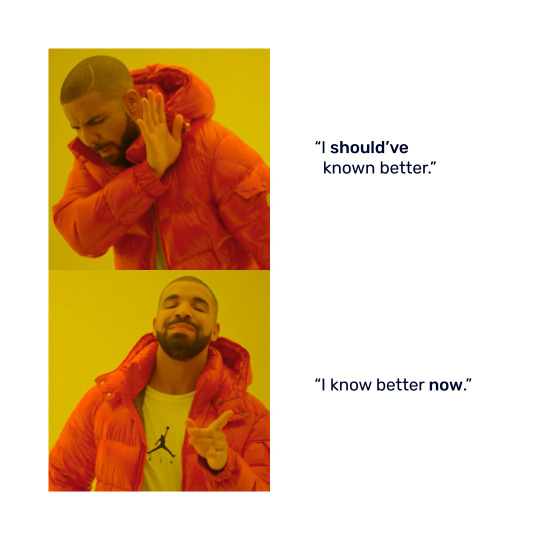
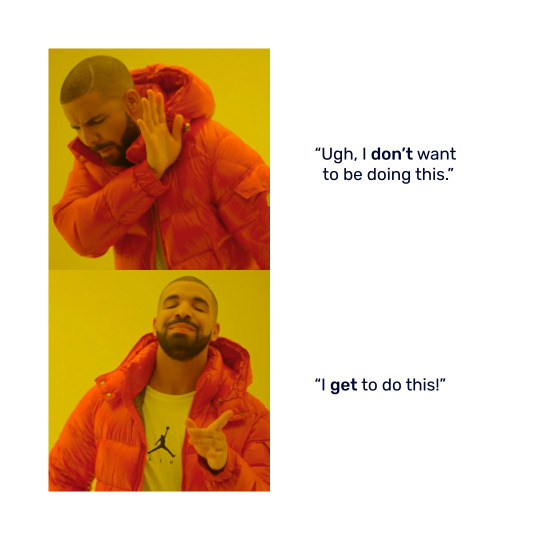
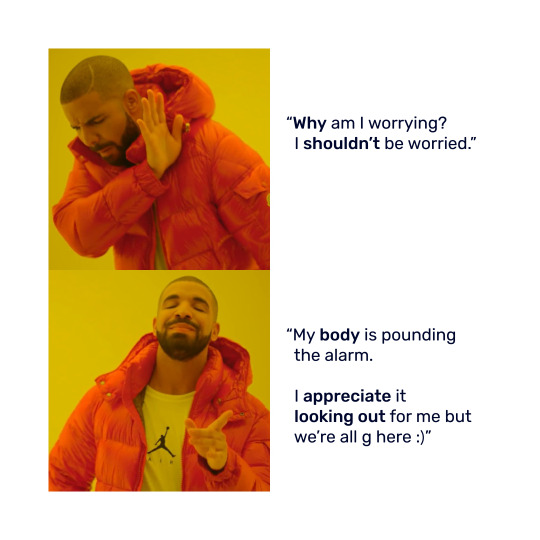
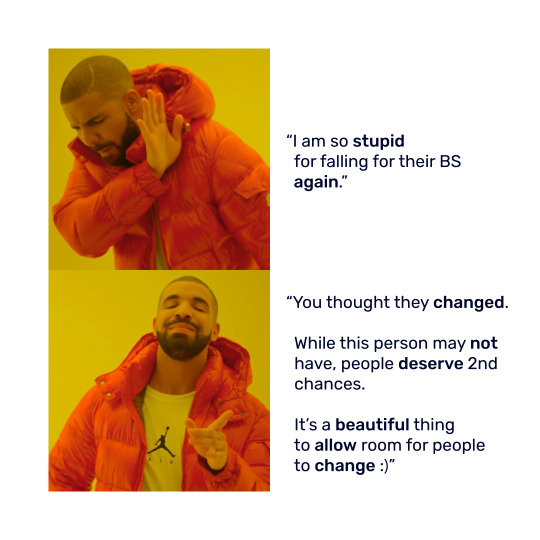
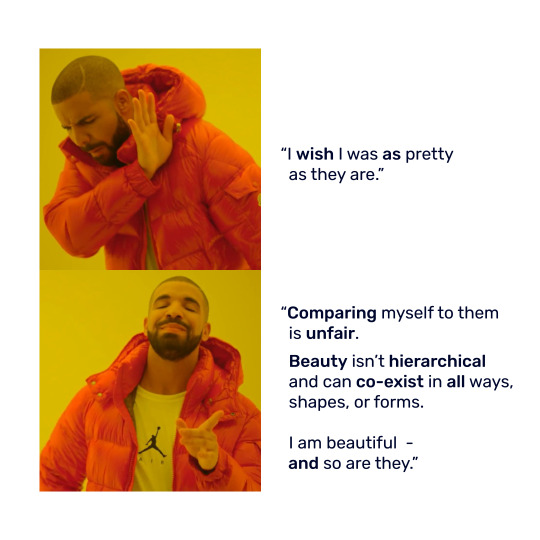
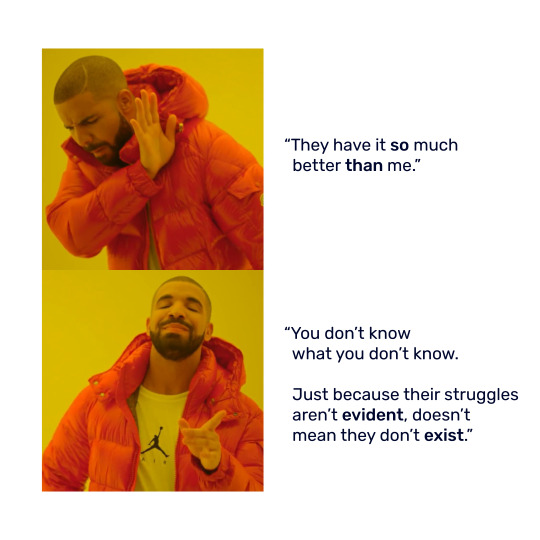
we all have good thoughts, bad thoughts, sexy thoughts, useful thoughts, and useless thoughts. but don’t forget this helpful banger of a wisdom: you are not your thoughts, but the thinker of your thoughts. you can CHOOSE which thoughts to believe in and eventually your thoughts will end up believing you too 🤯 click the link to figure out how to do so.
7 notes
·
View notes
Text
An CBT thought reframe example:
Think different. Feel Different. Behave Different. This post introduces you to the structured ABCD-NC modelling that your brain will love. Build awareness and self regulation of stress-thinking (cognitive distortions and bad thinking habits) with cognitive behavioural therapy. An ABCD-NC exampleActivating Event or Situation (A): This is the initial trigger or situation that sparks your…
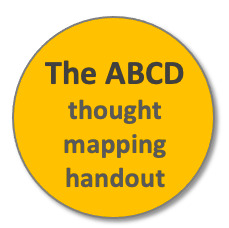
View On WordPress
#cbt handout#cbt journaling template#cbt worksheet#cognitive behavioral therapy worksheets#dispute and reframe cognitive distortions#the abcd thought form#the ABCD-NC worksheet#veronica walsh cbt resources
3 notes
·
View notes
Note
INFP 16. I love (and also really really hate) what you said about lack of objectivity. After reading about Si loop and pessimism, I'm more aware and try to balance with affirming thoughts. Do you think it helps body dysmorphia too? I'm not diagnosed or anything, I just really hate how I look sometimes. I used to think my judgements were right because of "fact" (like there's a line/mark/bulge to point at) but it's just another thing I get too negative about?
The notion of beauty standards is complicated, so you can read what I've written about it before. Suffice it to say that very few judgments regarding beauty should be considered "objective". You only need to study a bit of history to realize that beauty standards vary widely based on time and place, which reveals a social construct.
As an individual, your idea of beauty is very heavily influenced by the culture and society you live in. I always bring up the story of The Ugly Duckling to illustrate in simple terms what it means to have your perception (of beauty) twisted by society.
You see a line/mark/bulge and think ew gross, others might see something else. One person sees an ugly mole, another person flaunts it as a beauty mark. Your way of looking at it isn't the only valid way, so if your way always suspiciously turns toward the negative, then, yes, maybe you need to rebalance your perspective. Or, there might be a deeper self-esteem issue that needs addressing (especially as it relates to Te grip).
Body dysmorphia can feel like a vicious cycle: You feel bad about yourself for whatever reason, and then you start picking out the stuff in the mirror you don't like seeing, and then you feel even worse about yourself, and then you pick yourself apart even more harshly...
There are a variety of ways to recalibrate your perspective. If you're too negative or critical, then, yes, you can remind yourself to look for the good things you like. For example, you might not like this characteristic of your body, but that other aspect is awesome, so why only focus on the negative? It's unreasonable to expect perfection.
Another method of recalibrating your perspective is to broaden or deepen it:
Example of broadening:
People young and old have written to me about feeling aging anxiety every time they look in the mirror and see a line or a gray hair. But when I look at my parents and aunts and uncles getting older, I don't see them "aging" per se. I see them growing into their skin. I see the evidence of a full life written on their body, and I think it's beautiful and wonderful that they've made it so far in life. Average life expectancy in 1900 was 47, so humans have come a long way!
As I witness myself getting older every birthday, I'm a bit critical if I'm honest, but I quickly adjust my attitude. Instead of fixating on this or that detail, I look at myself and reflect on how extremely fortunate I am to be in good health because I have access to health care, healthy food, and my life isn't so stressful that I can't sleep well at night.
Taking "the grand scheme of things" as your perspective, lines/marks/bulges don't mean much. What matters more? What matters most? If you don't want to live in a society that only values people for their looks, then the change should begin with yourself first and foremost.
Example of deepening:
The way you look is largely determined by genetics, and looks will fade with age. Should you take credit for accidents of nature? Well, if you're going to feel good about yourself through others praising your genes as beautiful, the flip side is that you doom yourself to feeling bad when people don't.
From this perspective, the better approach is to have a deeper understanding of self-worth and how it should NOT be tied to things that have no real meaning, or things beyond your control that you shouldn't be faulted for.
Sure, it's a fact that people who are considered beautiful might have more doors opened to them, but it is also a fact that being a good person is likely to bring you many meaningful rewards in the long run. When people like you mainly for your looks, what happens when you inevitably lose them? When people love you for who you really are at heart... now that's gold. Why settle for less?
.
Adjusting your perspective (aka cognitive reframing) isn't about lying to yourself but, rather, acknowledging that your thinking is flawed and needs correction or improvement. It is a tried-and-true way of mitigating excess negativity. And it should be relatively easy to do for anyone with a healthy N function. How's your Ne?
#infp#auxiliary ne#si loop#physical appearance#body dysmorphia#negativity#cognitive reframing#self esteem#self worth#ask
14 notes
·
View notes
Text
That's it. My intrusive thoughts are now xbox live insults. Go to bed timmy it's 8pm
3 notes
·
View notes
Text
Cognitive Restructuring Worksheet
“Which behaviors did your caregivers use in your childhood?”
“In what ways do you use them now? Behavior →Action Think of the situations in which these things happened. What would have been a nurturing response? Situation →Nurturing Response”
Excerpt From Healing Your Wounded Inner Child: A CBT Workbook to Overcome Past Trauma, Face Abandonment and Regain Emotional Stability. (Cognitive Behavioral Therapy) Maria Clarke This material may be protected by copyright.
2 notes
·
View notes
Text
Breaking the Spell: When Your Belief System Isn’t Even Yours
Subscribe to continue reading Subscribe to get access to the rest of this post and other subscriber-only content. Type your email… Subscribe Already a subscriber?

View On WordPress
#awakening#awakening series#belief systems#BS#CBD#Cognitive reframing#exploring#health#journaling#mental health#podcast#socratic questioning#struggle#wellness#workbook
0 notes
Video
youtube
5 Tips To Turn Terrible Days Into Triumphs
#youtube#BadDayTurnaround 💥#PositivityChallenge#GratitudeOverGrumbles#Winning_Mindset25#PerspectiveShiftMagic#StressToSuccess#ResilienceReboot#FindTheSilverLining#MindsetMakeover🌱#TerribleToTriumph#MentalWellnessMatters#DailySunshineHunt#ReframeYourDay#OvercomingAdversity#SelfCareRevolution#JoyfulLiving#EmotionalResilience#PositivityWarrior#SilverLiningSeekers#ShareYourShift#Resilience hacks#daily motivation#overcoming bad days#positive mindset#cognitive reframing#attitude adjustment
1 note
·
View note
Text
Living with Allergies and Managing Hypervigilance: A Guide to Balance and Well-being
This post comes from a specific question made by a special person, so here is my answer. Living with allergies, particularly life-threatening ones, is a unique challenge. The constant need to monitor environments, foods, and even medications can lead to a heightened state of awareness, commonly referred to as hypervigilance. Photo by cottonbro studio on Pexels.com While this vigilance is…

View On WordPress
#allergy#anaphylaxis#cognitive reframing#histamine#Hypervigilance#immune responses#life-threatening allergy#Raffaello Palandri#self-hypnosis#Severe Burn Unit#SJS#Stevens-Johnson Syndrome#tapping#TEN#Toxic Epidermal Necrolysis
0 notes